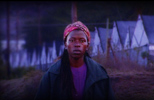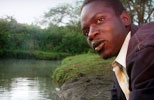
Film information 3
Film screenings 4
Synopsis 5
Credits 6
About the director & directors statement 7
Resume director Ton van Zantvoort 8
Publications 9
Film stills 10
Directors stills 12

Film details
Original title: a BLOOMING BUSINESS
Original language: English/ Swahili
Subtitled language: 22 European Union languages
Homepage: www.newtonfilm.nl/blooming_business/
Running time: 52 minutes
Date of completion: March 2009
Date/ place of first screening: March 13, 2009/ Thessaloniki, Greece
Country of Filming: Kenya, The Netherlands
Country of Origin: The Netherlands
People
Production company: NEWTON film
Producer/ director: Ton van Zantvoort
Country: The Netherlands
Date of Birth: 23-06-1979
Cellular +31 6 410 390 81
Fax +31 8 474 462 00
E-mail: info@newtonfilm.nl
Filmography: GRITO de PIEDRA/ 59 min/ 2006
First/ second film: yes
Co-production: VPRO/ Barbara Truyen
World distribution: NEWTON film
Sales contact: US/ Canada: 7th Art Releasing
Sales contact: World: Journeyman Pictures
Technical information
Preview copy: 52 minutes, DVD PAL/ NTSC, online screening possible
Exhibition format:
1. Digibeta PAL, 16:9 (anamorphic),
1.66, English sub, color, 52 min, Dolby Digital stereo
2. HD cam NTSC, English subtitles,
English Subtitles
3. DV cam French subtitles
4. DVD with 22 European Union Languages
Categories: Human interest /-rights,
social/ environment issues, globalization
Awards
- Jury Award, FIFDH, Festival International du film des droits de l'homme de Paris, 2011
- Audience award, The Art of the Document, 2010
- Special jury mention 2010
- Golden olive award for best documentary, International Festival, Montenegro 2010
- Audience Award, Millenium International Documentary Festival, Belgium 2010
- Award for best film chosen by media professionals, Festival Internacional de Cinema Ambiental FICA, Brasil 2010
- Best photography Award, XV International TV Festival Bar, Montenegro,2010
- Jury Award best treatment, Cinema Planeta, Mexico 2010
- Audience favourites Mixed Greens, Planet in Focus, Canada 2009
- Open Eyes Award special mention, Medfilm Festival, Italy 2009,
- Dok Leipzig Healthy Workplaces Film Award, International Leipzig Festival, Germany 2009

Selection of International Film Festivals
TDF competition, Thessaloniki Documentary Festival,Greece, 13 March 2009
IFFB competition, International Film Festival Breda, The Netherlands, 27 March 2009
Plaza Futura, The Netherlands, May 2009
Film Café Grave, The Netherlands, May 2009
Verkade Fabriek, The Netherlands, May 2009
Green Film Festival in Seoul, Korea, May 2009
Electron, The Netherlands, May 2009
Cinema City 09, Serbia, June 2009
TAC, The Netherlands, June 2009
Filmfoyer, The Netherlands, June 2009
Rodos International Films+ Visual Arts Festival, Greece, June 2009
NZIFF competition, New Zealand International Film Festival, New Zealand, July 2009
Groene Engel, The Netherlands, July 2009
VIFF competition, Vancouver International Film Festival
National Cinemateque, Denmark, September 2009
NFF, Dutch Film Festival, The Netherlands, September 2009
MEDI MED Docs come true, Spain, October 2009
Planet in Focus, Environmental Film Festival, Canada 2009
DOK Leipzig, Germany, October 2009
AFF competition, 10th Astra Film Festival, Romania, 2009
ânûû-rû âboro,
Peoples’ film festival, New Caledonia, November 2009
Med Film Festival competition, Italy, November 2009
International Documentary Festival Agadir competition, Morocco, December 2009
DOCPoint Helsinki Documentary Festival competition, Finland, January 2010
Human Rights Human
Wrongs, Norway, february 2010
Cinema Planeta Mexico, Mexico, March 2010
Montreal Human Rights Film Festival, Canada, March 2010
Cronograf Documentary Film Festival, Moldova, May 2010
Planete Doc Review - Against Gravity 2 competitions, Poland, May, 2010
FICA - Festival International de cinema e video ambiental - Brasil, June 2010
Centraal Museum Utrecht - In your face, june - September 2010
Bolivia el septimojo es tuyo, Bolivia, June 2010
Documentarist Film Festival, Istanbul, Turkey, June 2010
Millenium Film Festival - Belgium, June 2010
Criterio Ambiental, Costa Rica, September 2010
Split New film festival Poland, September 2010
Centraal Museum - Recht voor zijn Raap / In your face, June - September 2010
Jihlava IDFF, Czech Republic, October 2010
Duke City DocFest, Albuquerque New Mexico, October 2010
International TV Festival Bar, 15th festival, Montenegro, October 2010
Etnia FIlm Festival, Finland, October 2010
Ad Hoc Inconvenient Films, LHCR, Lihuania, October 2010
This Human World, Austria, October 2010
Art of the Document, Multumedia Festival, Poland, November 2010
More screenings coming soon...

Synopsis 100 words
a BLOOMING BUSINESS is a poetic documentary by TON van ZANTVOORT about people in Kenya who are imprisoned by the global flower industry. The dilemmas of the industry become painfully clear and a dark world of oppression, sexual abuse and terrible working conditions unfolds. There is only one conclusion possible: the smell of the imported rose is not sweet, but bitter.
The film combines pure observation with direct comments of the main characters. The camera is absent and present at the same time. With great humanity van Zantvoort shows us a different world in which all human life is valuable.

Film description 519 words
a BLOOMING BUSINESS is a poetic documentary by Ton van Zantvoort about people in Kenya who are imprisoned by the global flower growing industry. Flowers love people, is a well known Dutch saying, that the flower industry tries to propagate. But whether flowers actually do love people remains the question. A large percentage of flower production in third world countries, where the pay checks are low and the environment constraints are flexible, is auctioned in The Netherlands.
In an assertive way, a BLOOMING BUSINESS shows the world of Jane, Kennedy and Oscar. Jane is a single mother who works at one of the many flower farms in Naivasha, Kenya. She works day and night for her survival and to be able to feed her children. Jane finds herself constantly exhausted and compares her life to that of a prisoner. Her supervisor forces her to have sex with him. If Jane would reject him, she would be fired and banned from working at other flower farms. She has no choice. If that would happen, who would look after her children? Jane’s family lives far away. She has been all by herself since she immigrated to Naivasha. There were rumors that one can make a considerable amount of money working in the flower industry. However, once you arrive in Naivasha, the reality turns out to be far from positive. Jane is imprisoned in her situation; she does not even have the money to go and visit her family. To her, the rose means hard work, thorns in her hands and exposure to a lot of dangerous chemicals. However, despite her hard and difficult life, beating her down, Jane remains fighting for her children’s dreams and future.
The flower is a huge source of income. But for whom? The flower industry in Naivasha – and anywhere else in the world – demands its price both socially and ecologically. Each rose bush needs 1,5 liter of water per day. Fisherman Kennedy suffers from this and watches his catch diminish daily: “the surface of Naivasha’s lake decreases a lot each year because of this water consumption and the water is polluted by the use of chemicals and pesticides of the surrounding companies.” Another victim is Oscar. He was also fired by a flower company and ever since, in order to make a little money has been transporting the polluted water from the lake in jerry cans to the community by mule. He knows the water is polluted, but Oscar, just like the community who drinks the water, has no other choice.
Do flowers also love these people? Everything is being done in order to keep up appearances of the flower industry, as, together with tourism, flower export is Kenya’s largest source of income. The dilemmas of the industry grow painfully clear. There is only one conclusion possible: the smell of the imported rose is not sweet, but bitter. Pure observation goes unnoticed, hand in hand, with straightforward comments from the main characters throughout this film. The camera is present and absent at the same time. With great humanity van Zantvoort shows us another world in which the life of each human being is valuable.

52 minutes, 2009 |
GEOFREY |

About the director 52 words About the director
alternative 136 words |
About the director & the film 107 words Directors statement 70 words |

Education
1999- 2003
Art Academy St. Joost, Audiovisual design. diploma obtained with credit
1996- 1999
Grafisch Lyceum Eindhoven, Art-direction. diploma obtained
1991- 1996
HAVO, Maaslandcollege Oss. diploma obtained
Filmography
a BLOOMING BUSINESS/ 53 min/ poetic documentary / 2009
GRITO de PIEDRA/ 59 min/ documentary/ 2006
Khamu village/ 25 min/ documentary/ 2003 (student work)
Festivals
Doc Review/ Poland/ 2010
Montreal HRFF/ Canada/ 2010
Human Rights Human
Wrongs/ Norway/ 2010
DOCPoint Helsinki Documentary Festival/ Finland/ 2010
DOK Leipzig/ Germany/ 2009
GFFIS / Green Film Festival in Seoul /Korea / 2009
Netherlands Film Festival/ the Netherlands/ 2009
IFFB, International Film Festival Breda/ Breda/ The Netherlands/ 2009
TDF, Thessaloniki Documentary Festival/ Thessaloniki/ Greece/ 2009
Margaret Mead Film Festival/ New York, Chicago, Florida, Vermont, Indiana/ ‘08-’09
Astra film Sibiu/ Romania/ 2007
Netherlands Film Festival/ the Netherlands/ 2007
Festival de Cine y video de los derechos humanos/ Bolivia/ 2007
DOCSDF- Festival International de Cine Documental/ Mexico/ 2007
Rodos ecofilms International Films & Visual arts Festival/ Greece/ 2007
IDFA/ Amsterdam / 2006
Iowa city International documentary festival/ IOWA / 2006
Awards & Nominations
- Audience Award, Millenium International Documentary Festival, Belgium 2010
- Press Award, Festival Internacional de Cinema Ambiental FICA, Brasil 2010
- Jury Award best treatment, Cinema Planeta, Mexico 2010
- Audience favourites Mixed Greens, Planet in Focus, Canada 2009
- Open Eyes Award special mention, Medfilm Festival, Italy 2009,
- Dok Leipzig HW Film Award, International Leipzig Festival, Germany 2009
- Startstipend award BKVB 2007
- Highlights of the Lowlands/ IDFA 2006/ GRITO de PIEDRA
- Honourable Mention/ Media city 13 Visual art Festival 2007/ Pack
- 2nd award NFTVM
award 2006/ for best new Dutch filmmaker
- 4th price 1 minute & sound award 2006/ dogs
- Scenario Nomination (Scenario workshop during IDFA)
- Nomination for St. Joost Penning/ 2003
- Scenario Nomination NPS Uur van de Wolf
- Startstipend award BKVB 2005
Additional
- Doc Review/ Warsaw, Poland/ Panel debate member with Frederik Gertten / 2010
- Margaret Mead Festival / Workshop and Lecture on the University of Manitoba 2009
- Masterclass with Cherry Duyns & Ton van Zantvoort / Nijmegen17-20 januari 2008
- Teaching Photography&Audiovisual design/ Art Academie 's- Hertogenbosch
- Lecturer in Poetic Documentary/ Academie St. Joost/ Mgr Frencken College
- Publications Filmkrant, IDFA daily, Brabants Dagblad, BN de stem, Dutch Filmfestival
- DVD
publications: Eenoog koning: Treasures of the filmbank, TEEK DVD

Publications in English (selection) |
|
| Eye for Film : |
Movie Review (2009) |
| Vancouver International Film Festival 2009 | movie review |
| DOKLeipzig Healthy Workplaces Film Award | EU-OSHA Mention |
| Edinburgh Internationa Film Festival (EIFF) web/ | articles/ press / reviews |
| Thessaloniki Documentary Festival (TDF), Greece, | March 2009, 10 pages |
| International Film Festival FICA , awards,reviews and articles, Brazil 2010 | |
| Docreview Poland panel debate with Frederik Gertten, 2010 | |
| Indiewire, 2009 (website) | |
| Green Festival Seoul, Korea, 2009 (website) | |
| Sundoc 13.09.2009 Copenhagen / Denmark | |
| Cinema City, Serbia, 2009 | |
| The Internet Movie Database (IMDB) | |
Radio & Television / interviews |
|
| Al Jazeera English, London, International, July 2010 | |
| VRT National radio Klara, with Heidi Lenaerts, Belgium, June 2010 | |
| Deutsche Welle Ethiopia, National Germany & International Africa, June 2010 | |
| TV Cultura zoom, National Brazil June 2010 | |
| TV Cultura Reporter Eco National Brazil June 2010 | |
| Edinburgh International Film Festival 2009 - Sky Movies, Movie Geek | |
| ET1, Thessaloniki, Greece, Tv interview, March 2009 | |
| TV10, The Netherlands, 2009 | |
| Omroep Brabant radio, March 2009 | |
| Dutch Radio interview March 2009 | |
Publications in Dutch |
|
| Trouw (National newspaper), june 2009 | |
| Holland Doc, june 2009 | |
| NRC Next (National newspaper), june 2009 | |
| Vakblad voor de Bloemisterij, june 2009 | |
| VPRO, june 2009, guide / KRO, june 2009 | |
| Bredavandaag, March 2009, IFFB / Februari 2009 | |
| BKKC - VBF Film in Brabant, 2009 (2 pages) / poster | |
| Filmkrant, International Film Festival Breda,2009 | |
| BN de Stem, March 2009 | |
| Eindhovens Dagblad 6 mei 2009 | |
| Zondagnieuws April 2009, / Bernhezer April 2009 | |
| TV- tip Arthouse film - Bloemen houden van mensen | |
| Thuis in het Nieuws - Groene Engel - twee documentaires | |
|
THESSALONIKI DOCUMENTARY FESTIVAL |
|

 |
 |
 |
||
 |
 |
 |
||
 |
 |
 |
||
 |
 |
 |
||